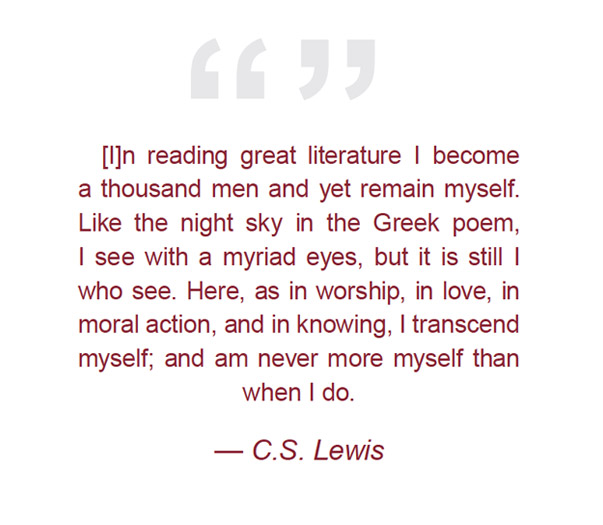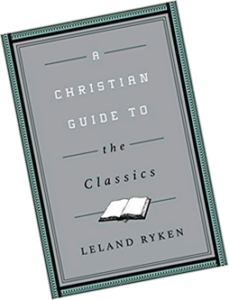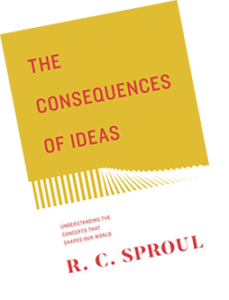Back to series


Recommended Reading:

Download or Listen to Audio
Great Books as Great Bridges to Great Conversations
Click here to open a Print-Friendly PDF
 Recently I was in a favorite coffee shop when the barista asked me what I was reading. When I answered, “Sören Kierkegaard’s parable “The King and a Maiden” from Philosophical Fragments,” she said, “Oh, what is that about?”
Recently I was in a favorite coffee shop when the barista asked me what I was reading. When I answered, “Sören Kierkegaard’s parable “The King and a Maiden” from Philosophical Fragments,” she said, “Oh, what is that about?”
I replied: “It is a story about a great king who fell in love with a humble maiden and considered how he might win her love and her hand in marriage. He thought of several options. He might come to her home in a royal carriage with an armed escort and ask her father for her hand in marriage.
She might agree to marry him, but her decision would be swayed by awe and respect for his position and not by true love. He could have her brought to the palace to be his wife. Although she might comply out of loyalty and obedience, it would be a violation of her freedom and therefore could not be for love. Both of these options would make her his wife but would not be a marriage of equals, for ‘love is exultant when it unites equals.’1 He considered another solution; he would renounce his throne and become a servant in her village where he would pursue her as an equal and seek to win her love and her hand in marriage.”
At this point, the barista said, “That is lovely!” After a brief pause, I asked, “What do you think Kierkegaard was trying to say about God?” I saw her expression change from wonder to surprise. Whether pleasant or not, I could not tell, but she had a thought and was in a conversation she had not foreseen. She was confronted with the possibility that there was a God pursuing her and this God had humbled Himself to take on human form to win her hand. She had begun to hear the gospel! It was an opportunity I might never have had without knowledge of the classics, literature that has shaped Western civilization. (For a discussion about the concept of classics, see “What Is a Classic?” by Leland Ryken.)2
During my undergraduate years, I was not encouraged to read the classics, because “you can’t make a living doing that.” I became an electrical engineer but felt there was a gap in my studies. I noticed how often my favorite apologists referred to the classics when answering tough questions about Scripture and its relevance to our culture and personal experience. A couple of years back, I came across this statement by John Mark Reynolds, one of my favorite apologists:
Plato is the best teacher for a culture wandering from biblical faith.3 When I was too dull for the Bible, Plato’s Republic brought me back to Jesus Christ.4 A kingdom, Plato notes, is better than any form of government if one can only find a philosopher-king. But where can one find a philosopher-king? Christians know the only answer. 5
I decided to engage in a study of the classics. Over the past two years, I have been studying classic Western literature at Saint John’s College in Annapolis, Maryland, where I am discovering the power of these books to engage a culture “wandering from biblical faith.” Here are some examples:
 Homer’s The Iliad and The Odyssey; Aeschylus’s Agamemnon, The Libation Bearers, The Eumenides; Euripides’s Hippolytus, Bacchae; and Sophocles’s Antigone, Oedipus the King, Oedipus at Colonus, are all Greek classics written between the eighth and fourth centuries B.C. These works give us a fascinating look into ancient Greek culture where a pantheon of gods were responsible for the world as they saw and experienced it. How could this be relevant to us today? These “gods” were whimsical, without moral virtues, and able to deny human freedoms to accomplish their purposes.
Homer’s The Iliad and The Odyssey; Aeschylus’s Agamemnon, The Libation Bearers, The Eumenides; Euripides’s Hippolytus, Bacchae; and Sophocles’s Antigone, Oedipus the King, Oedipus at Colonus, are all Greek classics written between the eighth and fourth centuries B.C. These works give us a fascinating look into ancient Greek culture where a pantheon of gods were responsible for the world as they saw and experienced it. How could this be relevant to us today? These “gods” were whimsical, without moral virtues, and able to deny human freedoms to accomplish their purposes.
Men and women were left without moral compasses, deciding for themselves what was right and wrong, and ultimately not responsible for their actions because of the influence of external forces. Does this sound familiar? A postmodern, secular humanistic culture can identify with ancient Greece because of its similar worldview. The pantheon of immoral gods has been replaced by a community of immoral mortals with the same disastrous results; men and women who are confused about morality, identity, purpose, evil, and hope. The opportunities to relate Greek cultural experience to today’s world are endless in these works.
Plato (fourth century B.C.) recorded his account of first beginnings in Timaeus. He suggests that “the cosmos is the most beautiful of things born and its craftsman the best of causes.”6 Plato looks at the evidence before him, nature and its beauty, and suggests it could not have come from nothing but rather is the work of a great “craftsman.” He further suggests the craftsman has made both soul and body. How powerful an idea from one who probably had no access to Scripture.
In Physics, Plato’s pupil Aristotle (fourth century B.C.) also takes up this line of questioning into the beginning of the universe. He observed that everything seems to be in motion, and “did motion itself ever come into existence, never having been before?”7 He argues that everything moving was moved by something else, but this process could not regress ad infinitum. There must be a prime mover that itself is not moving, an “unmoved prime mover.”8 He continues with arguments for the attributes of the prime mover: unlimited power, eternal, self-sustaining, indivisible, an “agent” of motion.9 This was a risky proposition in a culture that believed in a pantheon of gods, none of which fit this description.
Lucretius lived in Rome in the first century B.C. He was a strict materialist, a follower of Epicurus. He sought to convert the Romans from their polytheistic worship to materialism. He believed “nothing ever comes to be from nothing through divine intervention”10 and presented his comprehensive worldview in his poem On the Nature of Things. In his argument for a materialistic universe, ironically, he presents a wonderful cosmological argument suggesting that the first cause of all things must exist eternally, have no parts, be unchanging.11 Is this not an opportunity to affirm his thought and suggest an alternative meaning?
Perhaps one of the most influential classics today is Saint Augustine’s Confessions (fourth century A.D.). I have personally seen students come to faith because of their identity with Augustine’s struggle with lust and his candid admission of the evil at work within him.
The book opens with his oft quoted words: “You have made us for yourself, and our heart is restless until it rests in you.”12 Everyone who does not have God’s Spirit residing within can relate to a “restless heart.” Augustine also struggles with the ideological remnants of the cult of Manicheism. His struggle with and ultimate freedom from the teachings of this cult are an example for anyone who is in bondage to false teachings and desires to know God in truth.
No Christian apologist’s library is complete without a well-read copy of Summa Theologica: Volume I, Part I, by Thomas Aquinas (thirteenth century A.D.). Questions about God and His attributes, creation, mankind, angels, and demons are addressed in this first volume. A question is posed, for example, “Whether the Essence of God Can Be Seen with the Bodily Eye?” followed by “Articles” that state an objection to be overcome regarding the question and Aquinas’s response to the objection. This is not easy reading, but it will equip the serious student with thoughtful answers in support of Scripture’s teachings.
 Several of the stories in Geoffrey Chaucer’s Canterbury Tales (fourteenth century) have deep gospel inferences, as one might expect when these tales are being told by Christians on a pilgrimage to visit the shrine of Saint Thomas à Becket. One of my favorites is “The Clerk’s Tale.” I have summarized the story as it might be told from a character within the tale, Griselda, a commoner who became queen:13
Several of the stories in Geoffrey Chaucer’s Canterbury Tales (fourteenth century) have deep gospel inferences, as one might expect when these tales are being told by Christians on a pilgrimage to visit the shrine of Saint Thomas à Becket. One of my favorites is “The Clerk’s Tale.” I have summarized the story as it might be told from a character within the tale, Griselda, a commoner who became queen:13
I was a commoner tending my sheep when a mighty lord arrived at my house and asked my father for my hand in marriage. His only demand was that I respect his decisions, whether they made me laugh or cry, and never grumble, frown, or say no to any requests he may make of me. Out of awe and fear of his presence and request, I did say yes to his demand.
After some time together, he sought to test my loyalty, which I had never given him occasion to doubt. He made me endure three tests. The first two required me to part with my children, unto death I thought, because of the discontent of his subjects over my low degree. The third test required me to give up my royal position as his wife, be stripped of my royal robes, and return to my home, suffering the disgrace and scorn of the kingdom.
Soon after returning home, my lord came for me and asked if I would return to the kingdom as his servant and make all the arrangements for another to take my place as his wife. I did all this without complaint, grumble, or frown. I experienced death of family and marriage. At the depth of my despair, I asked my lord, my husband, “that you prick not with any tormenting” any others with the adversity I had endured.
It was then that my lord’s countenance changed. He reached for me, kissed me, and raised me to my feet. He did return to me my children, whom I thought dead, and restored to me my royal position. He crowned me with a crown of precious stones and brought me into the great hall where the entire kingdom paid me honor.
I recently shared this story with a Sunday seminar group at the US Naval Academy. The discussion that followed was rich: How was Griselda like Christ? How is this tale like the gospel? What do the actions of Griselda’s husband say about God, according to Chaucer?
But here we need to offer a warning. These books are not Scripture! Some are written by authors who are followers of Jesus and follow biblical orthodoxy; others are written by authors who may or may not know the biblical narratives or who and write stories filled with vulgarity and obscenities (like some in the Canterbury Tales). While components of the gospel or a longing for the gospel can be found in many of these books, the components can be incomplete or inaccurate. These are still useful for discussion and offer the person knowledgeable in Scripture the opportunity to share the “better” story.
 René Descartes (seventeenth century) saw the emergence of naturalism in his culture. To secure funding from the church for his philosophical work, he set out to make a rational argument for the duality of the soul and body (apart from Scripture). His Discourse on Method and Meditations on First Philosophy are the result. Perhaps his most famous quote is “I think therefore I am.”14 The power of his work is that prior to his writings the soul was thought to be purely a metaphysical idea. Descartes demonstrated by reason alone that the soul was a rational idea suitable for discussion in the public square.
René Descartes (seventeenth century) saw the emergence of naturalism in his culture. To secure funding from the church for his philosophical work, he set out to make a rational argument for the duality of the soul and body (apart from Scripture). His Discourse on Method and Meditations on First Philosophy are the result. Perhaps his most famous quote is “I think therefore I am.”14 The power of his work is that prior to his writings the soul was thought to be purely a metaphysical idea. Descartes demonstrated by reason alone that the soul was a rational idea suitable for discussion in the public square.
The person knowledgeable in Scripture will recognize throughout Descartes’s work frequent paraphrases of the truth of Scripture to appeal to the naturalist reader. I have witnessed the effectiveness of this in the classroom as students grasped his ideas as true, not recognizing their ultimate source. It makes for great postclassroom discussion.
Charles Darwin’s The Origin of the Species (nineteenth century) is a must-read for anyone serious about engaging today’s culture. In Darwin’s day, the universe was thought to be eternal, and knowledge of the past from fossils was limited. Darwin proposed a theory, an explanation of the emergence of life from a single cell. If he were alive today, would he be a Darwinist? A Darwinist has the presupposition that Darwin’s theory is fact before examining and interpreting the evidence.
But Darwin said: “If it could be demonstrated that any complex organ existed, which could not possibly have been formed by numerous, successive, slight modification, my theory would absolutely break down.” After more than 150 years, many have raised objections and given examples of things that would, most likely, cause Darwin’s theory to “break down.”15 Given the way Darwin approached his theory, he might modify his theory. One must have knowledge of this book to engage today’s naturalists.
This concludes our tour of the classics, and we have only touched the surface. There are many other great thinkers we could have discussed, such as Kant, Bacon, Hume, Shakespeare, and the great poets.
Yes, in all the above there are elements of truth whether intended or not by the author. Why is this often the case? Is this not what we would expect if we are made in the image of God and wired to appreciate the “the greatest story ever told”? Would we not find stories and myths about redemption, self-sacrifice, even resurrection? This is exactly what C.S. Lewis expressed to his friend Arthur Greeves in a letter, October 18, 1931, recalling his conversation with Hugo Dyson and J.R.R. Tolkien:
Now what Dyson and Tolkien showed me was this: that if I met the idea of sacrifice in a Pagan story I didn’t mind it at all: again, if I met the idea of a god sacrificing himself to himself… I liked it very much and was mysteriously moved by it: again, that the idea of the dying and reviving god (Balder, Adonis, Bacchus) similarly moved me provided I met it anywhere except in the Gospels. The reason was that in Pagan stories I was prepared to feel the myth as profound and suggestive of meanings beyond my grasp even tho’ I could not say in cold prose “what it meant”.
Now the story of Christ is simply a true myth: a myth working on us in the same way as the others, but with this tremendous difference that it really happened.16
The classics demonstrate that from antiquity, men have sought meaning and understanding in the world they live in. Some have knowledge of the gospel, and their writings reflect their deep appreciation for its redemptive power. Others, who did not have access to Scripture, demonstrate a desire for the things of God, affirming Rom. 1:19–20:
Since what may be known about God is plain to them, because God has made it plain to them. For since the creation of the world God’s invisible qualities—his eternal power and divine nature—have been clearly seen, being understood from what has been made, so that men are without excuse. (NIV 1984)
Becoming familiar with the classics provides new opportunities to engage a culture “wandering from biblical faith.” Take C.S. Lewis’s advice: “It is a good rule after reading a new book, never to allow yourself another new one till you have read an old one in between.”17 Take the challenge given to Augustine: “Pick up and read, pick up and read.”18 Your life and the lives of those in your sphere of influence may be changed forever.
Notes:1 Sören Kierkegaard, “The God as Teacher and Saviour: An Essay of the Imagination,” Philosophical Fragments (Princeton University Press, 1985), 22. |
|||

Jim Phillips
CSLI Teaching FellowJim Phillips founded the C.S. Lewis Institute in Annapolis, Maryland in 2009 and is currently a Teaching Fellow. He graduated from the U.S. Naval Academy in Annapolis, MD, with a Bachelor of Science in Electrical Engineering. After graduation he served in the U.S. Marine Corps as an AV-8A Harrier pilot and in the corporate world as an information technology executive. He received a Master of Arts in Liberal Arts from St. John’s College in Annapolis, Maryland, a Post Graduate Diploma in Theology and Religion from the University of Oxford in Oxford, UK, and a Doctor of Philosophy in Islamic Studies from the Oxford Centre for Mission Studies/Middlesex University in Oxford, UK. Jim is the author of God’s Megathemes: A Grandfather’s Legacy.

Recommended Reading:
Leland Ryken, A Christian Guide to the Classics (Crossway, 2015)
We’ve all heard about the classics and some of us have even read them on our own. But for those of us who remain a bit intimidated or simply want to get more out of our reading, this companion to Crossway’s Christian Guides to the Classics series is here to help.
In this brief guidebook, popular professor, author, and literary expert Leland Ryken explains what the classics are, how to read them, and why they’re still valuable. Written to help you become a seasoned reader and featuring a list of books to get you started, this guide will give you the tools you need to read and enjoy some of history’s greatest literature.
R.C. Sproul, The Consequences of Ideas: Understanding the Concepts that Shaped Our World (Crossway, Redesign edition, 2018)
Plato. Aquinas. Descartes. Kant. Freud. These great thinkers are still impacting the culture today — from public-policy decisions to world events, theology, the arts, education, and even everyday conversations. In this classic book, the late R.C. Sproul expertly surveys history’s most influential streams of thought, proving that ideas are not just passing fads — they have consequences for generations to come. Helping readers better understand how many of these ideas have shaped their own thinking, this book will empower Christians to be a Christlike influence in the world.
 COPYRIGHT: This publication is published by C.S. Lewis Institute; 8001 Braddock Road, Suite 301; Springfield, VA 22151. Portions of the publication may be reproduced for noncommercial, local church or ministry use without prior permission. Electronic copies of the PDF files may be duplicated and transmitted via e-mail for personal and church use. Articles may not be modified without prior written permission of the Institute. For questions, contact the Institute: 703.914.5602 or email us.
COPYRIGHT: This publication is published by C.S. Lewis Institute; 8001 Braddock Road, Suite 301; Springfield, VA 22151. Portions of the publication may be reproduced for noncommercial, local church or ministry use without prior permission. Electronic copies of the PDF files may be duplicated and transmitted via e-mail for personal and church use. Articles may not be modified without prior written permission of the Institute. For questions, contact the Institute: 703.914.5602 or email us.
-
Recent Podcasts
An Unexpected Change – David Westerhoff’s Story
by David Westerhoff on November 8, 2024David Westerhoff’s faith never really extended outside of...Read More
-
The Faith of Jonathan Edwards
by Aimee Riegert, Arthur W. Lindsley on November 1, 2024
-
A Scientist’s Journey to God – Krister Renard’s story
by Krister Renard, Jana Harmon on October 25, 2024
-
Recent Publications
Will You Be Ready?
by Thomas A. Tarrants on October 23, 2024Tom Tarrants gives insights on how we can...Read More
-
Should Christians Be Involved with Politics?
by Kerry A. Knott on October 1, 2024
-
Isn ’t Atheism Based on Scientific Fact Whereas Christianity is Based on “Faith”?
by Cameron McAllister on September 1, 2024
0
All Booked
0.00
All Booked
0.00
All Booked
23169
ADVENT CALENDAR: The Amazing Prophecies Fulfilled by the Birth of Jesus Christ
https://www.cslewisinstitute.org/?event=advent-calendar-the-amazing-prophecies-fulfilled-by-the-birth-of-jesus-christ&event_date=2024-11-28®=1
https://www.paypal.com/cgi-bin/webscr
2024-11-28

Next coming event
Days
Hours
Minutes
Seconds
ADVENT CALENDAR: The Amazing Prophecies Fulfilled by the Birth of Jesus Christ
On November 28, 2024 at 6:00 amSpeakers

Jim Phillips
CSLI Teaching Fellow
Team Members

Jim Phillips
CSLI Teaching FellowJim Phillips founded the C.S. Lewis Institute in Annapolis, Maryland in 2009 and is currently a Teaching Fellow. He graduated from the U.S. Naval Academy in Annapolis, MD, with a Bachelor of Science in Electrical Engineering. After graduation he served in the U.S. Marine Corps as an AV-8A Harrier pilot and in the corporate world as an information technology executive. He received a Master of Arts in Liberal Arts from St. John’s College in Annapolis, Maryland, a Post Graduate Diploma in Theology and Religion from the University of Oxford in Oxford, UK, and a Doctor of Philosophy in Islamic Studies from the Oxford Centre for Mission Studies/Middlesex University in Oxford, UK. Jim is the author of God’s Megathemes: A Grandfather’s Legacy.







